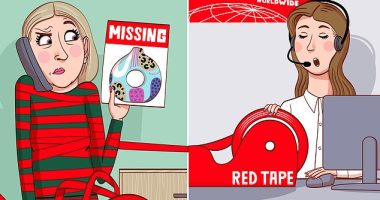THE process of claiming benefits can be challenging, but one expert explains how you can make the most of your application.
Benefits are there to help people who have found themselves in difficult situations get that extra financial support.
With the cost of living crisis and aftermath of the Covid pandemic, more people are turning to the government for extra support.
But the application process can be gruelling and many eligible people find themselves getting rejected.
Claims for benefits were wrongly rejected at a record rate in 2021.
Nearly 80,000 applications for Personal Independence Payments (PIP) were given the go ahead after initially being turned down.


Paul Brennan is the director of Benefit Answers, which helps those struggling with applications, or what to do if they’ve been rejected.
He spoke to The Sun and offered some guidance on how to make the most of an application and what to do during the assessment.
Take a step back
The first step of a benefits application process is usually filling in a form (though you can sometimes apply over the phone, depending on the department).
The first thing Paul said is to take a step back before putting pen to paper – think about how you’ll put your case forward.
Most read in Money
“We all find it difficult to describe our own problems and it’s important to give details and describe in as much detail as possible.”
He said it’s important to think about every day things that we often take for granted, and how you’re affected by them.
Stay consistent and explain why
Then, when filling in the benefits form, the most important thing Paul said to do is to stay consistent.
For example, someone may apply for benefits because they have Parkinson’s and have shaky hands, which will impact their every day life.
The benefits expert explained that he’s seen cases where someone has said they need help shaving for example, because of their shaky hands, but failed to say they also need help cooking.
An assessor may pick up the fact that you’ve only mentioned you need help with one thing, when your disability or illness may impact every aspect.
“They look for inconsistencies”, he said.
Paul also said that it might be worth asking a friend or family member what they think the applicant’s needs are, as sometimes we fail to notice our own struggles.
“If you have someone that you trust, ask them to have a read of the form.
“Ask then to see if it [the form] sound like you.”
“Sometimes you can’t see the problems yourself, ask someone to see if you’ve missed anything.”
“Take as long as you need on it and if you need longer, call the [benefits] office and they’ll give you extra time.”
Prepare, prepare, prepare
You’ll then be called into an assessment where you’ll be asked questions based on what you’ve written as well as further questions on why you should qualify.
Paul said the first thing to do is to make sure you have a copy of your application form and you’re up to speed with everything you wrote.
There’ll most likely have been a good few weeks in between sending off the application and the assessment meeting so you may have forgotten bits.
One thing where applicants fall short, which isn’t necessarily their fault, is that the assessor will be using this one interview to determine how your entire lifestyle is like.
Paul said: “The problem with these assessments is that they’re one snapshot [of someone’s life] so it’s isn’t necessarily going to get you the true prescription of someone’s condition.”
This, he said, can sometimes be to the detriment of the applicant as the assessor may presume they’re healthier than they actually are, just because they’ve had a “good” day.
The benefits expert then explained the structure of the interview.
“The first part is the medical problems, they’ll then go through the activities [you’ve listed] on the form.
“[They’ll] ask you what your day is like – you can repeat what you’ve said on the form,” he said.
“It’s [the interview] a case of listening to the questions because they’ll be looking for inconsistencies and will try to get you to say something that basically disagrees with what you said on the form.”
He said it’s similar to a job interview as you’ll want to present yourself in the best way possible, but you’ll also need to really highlight the challenges you face every day that will qualify you for that benefit.
He likened it to going to the GP, you have to show them your ailment or injury for example, and that’s what you’ll need to do in the assessment, otherwise they may presume you’re in much better circumstances than you really are.
Paul suggested you take someone with you and to even plan how you’re going to get there as this is something you’ll be asked too.
“You will more likely than not be asked how you got there – don’t shoot yourself in the foot.”
You can appeal your claim if it’s rejected
If your claim has been rejected, you’ll be able to appeal it.
At this stage it’s always best to speak to a benefits expert for support.
You can find someone by searching for an expert through your search engine.
Paul’s firm Benefit Answers is one of the many firms that supports claimants if their application has been denied.
You can also get help on benefit claims from Citizen’s Advice, MoneyHelper, StepChange and legal firms that offer legal advice on benefits.
If you’re able to speak to a benefits expert, they’ll go through your application and work out why it went wrong.
Paul said: “We put that argument to the DWP [or relevant benefits department] and hope they have the insight to change that decision.
“Most of the time they don’t but sometimes they do which is great.”
If that second claim is rejected then it’ll head to a tribunal.
It’s important to ensure you’re still fully brushed up on your original application form as you’ll still be asked about what you’ve written down.
Paul said: “We’ll support them and help them explain to the Tribunal what their problems are.
“More often than not they’ll say the decision was wrong [and therefore provide the applicant with said benefits].”


Bear in mind that benefit applications can vary depending on what you’re applying for.
We contacted the DWP, which said XXXX
Do you have a money problem that needs sorting? Get in touch by emailing [email protected]
Do you have a money problem that needs sorting? Get in touch by emailing [email protected]









